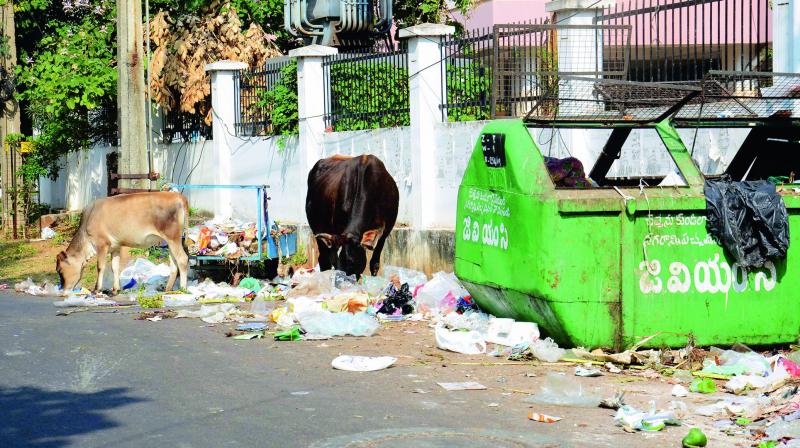Civic workers' stir stinks Visakhapatnam
Contract workers' agitation enters 5th day.

Visakhapatnam: The city roads were piled up with garbage as the contract sanitation workers have not attended their duties from the past few days. The municipal workers’ strike has entered the fifth day on Friday. The Greater Visakhapatnam Municipal Corporation is trying its best to maintain the main roads and shift the filled-up dumper bins with its permanent staff. However, the colony roads and drains were left unattended with the absence of contract workers, said Uday Shirname, president of Andhra Pradesh Federation of Resident Welfare Associations.
The GVMC contract workers union has been demanding the state government not to implement G.O. 279 and protested against it at Mahatma Gandhi statue opposite GVMC office on Friday. The union members demand the government to identify them as the municipality workers by providing minimum wages, PF and ESI. They are currently paid through Self Help Groups and Slum Level Federations.
The municipal workers across the state are agitating against the GO 279, which eliminates the role of SHGs in local municipal bodies and provides the complete sanitation works, including procurement of sanitation material, to the contractors. The contract workers allege that the civic body would lose more money if the GO is implemented. T. Nukaraju, general secretary of GVMC contract workers union said, “The municipality needs to pay 5.7 per cent GST that amounts more than '3 crore a year. Right now, they are not paying any tax to the SHGs.”
According to GVMC officials, talks are going on with the contract worker unions at the state level. The G.O. 279 will be implemented as soon as they receive directions from the state government. Already tenders have been called in first and second phases. The third phase of the tender process is running now. When asked about the tax burden on GVMC, an official informed that 5 per cent GST will attract if a contractor holds 90 per cent manpower and 10 per cent sanitation material. At present, the civic body spends Rs 70-80 crore a year on manpower and another Rs 15 crore a year for material. Post implementation of G.O. 279, the total expenditure may go up to Rs 100 crore a year.

